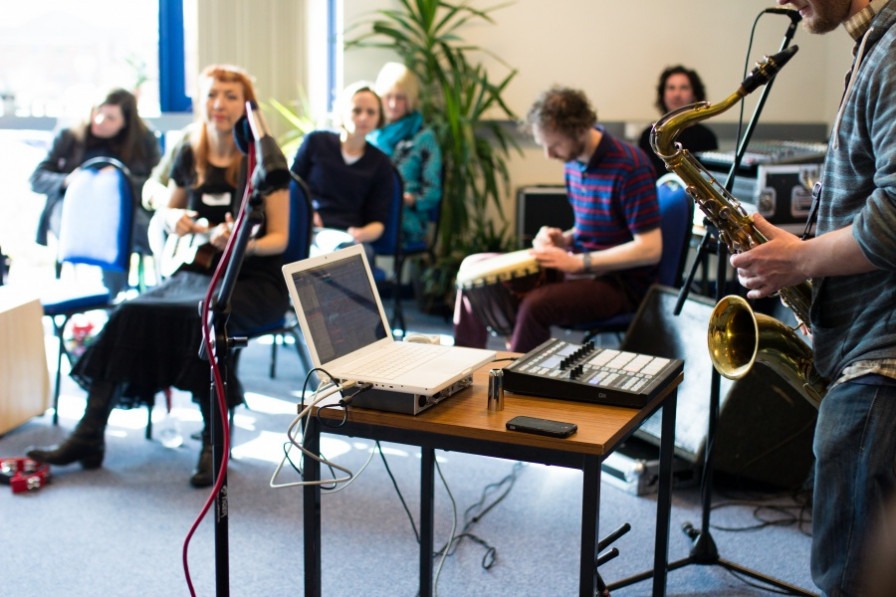Unconsciously uncontrolled > Subconsciously controlled

Whether you were a private music teacher, music service teacher or curriculum music teacher, delegates headed to Birmingham in September 2014 to join together in developing teaching to improve students' musical learning.
The events focused on progression and creative lesson activities. The delivery team onthe Wired for Sound Futures programme, funded by Youth Music attended This is what they thought.
Blog 1 Today I attended the Birmingham leg of the ABRSM & Music Mark Roadshow at the MAC alongside some of my colleagues from Make Some Noise, as part of the training provided for Wired for Sound Futures, a Youth Music funded programme. The content and resources of the roadshow were primarily targeted at the formal sector of music education but never the less there was information, tools and guidance which can be easily transferred into the informal sector.
There were a few key things that captured my imagination at the event but the main one of which was centred around the assessment of skill based learning with the idea being that there are 4 stages to acquiring a skill; Unconsciously uncontrolled --> Consciously uncontrolled --> Consciously controlled --> Subconsciously controlled.
This struck a chord with me because it took me back to how I learned some of my music skills and then in turn how I assess my own teachings on children and young people. It hammers home the importance of dependent learning and how it transitions to independent learning which is, in my opinion, the greatest yardstick for self-sufficiency in skill transfer.
When a child doesn't need me to be next to them for them to make music anymore and they've learned the skills required to self correct and sustain their own learning environment it means that skills have been passed on in an effective manner. What a rewarding thought. The notion of this thought would not be in my mind had I not attended this event today.
Blog 2 Today I attended the Birmingham leg of the ABRSM & Music Mark Roadshow at the MAC alongside some of my colleagues from Make Some Noise, as part of the training provided for Wired for Sound Futures, a Youth Music funded programme.
I found the Musical Learning really insightful. It reinforced the importance of fact based teaching and importance of spending time teaching fundamental basics of a musical skill (a principle which applies to any other skill such as poetry/lyric writing).
There were some key points that Jessica (the session leader) conveyed which I felt were useful - in that practice and performing are two very different things, but reinforced the importance of adding tone/emotional emphasis at as much as possible to either performance. The 1, 4 or Maybe More session proved interesting too, this was a much more practical session. Starting with a cool warm up activity (that I'll certainly be using in future) which led to a name game then a level building percussion exercise which progressed in stages. This was a good demo of how to orchestrate a group with different percussive instruments. Overall I feel I came away with a more enriched Music Leader tool kit then when I went in.
There are useful elements that I can see working well on the Wired for Sound Project which lends itself to 7 - 30 or so participants a session (which includes schools) so the day helped invigorate my practice with reassurance and a few new insights and activities.
The networking afterwards was also great as that led to further sharing of ideas for teaching!
Blog 3 I attended the roadshow, held at MAC in Birmingham, with a group of musicians as part of the training provided for Wired for Sound Futures, a Youth Music funded programme.
The majority of participants at the event were peripatetic, school and private music teachers. The content of the course inspired me with new skills and teaching perspectives that could be applied in my practice both as a community musician and private teacher. The ‘One, four and many more’ workshop gave practical activities to develop general music skills, help children to focus, feel confident and engage – working at the skill and confidence level that the child is at.
The second workshop was structured around teaching a piece of music the presenter provided a step by step framework for imparting musicality and musicianship from the very beginning of a child’s musical journey – underpinned with the emphasis on ensuring a child has a meaningful relationship with the music they play in order to inspire and enthuse.
